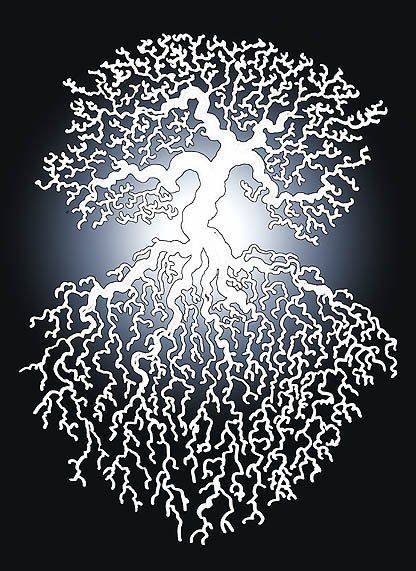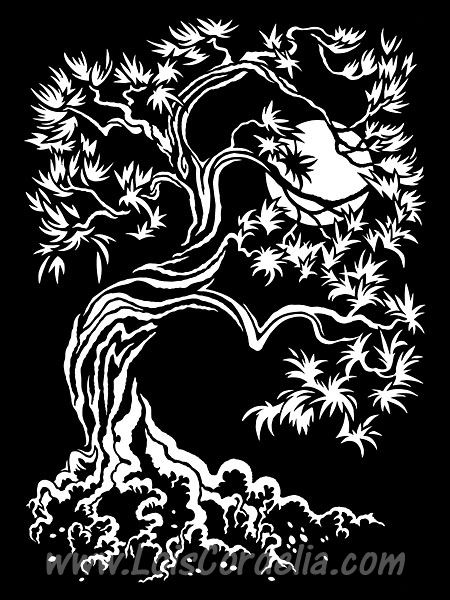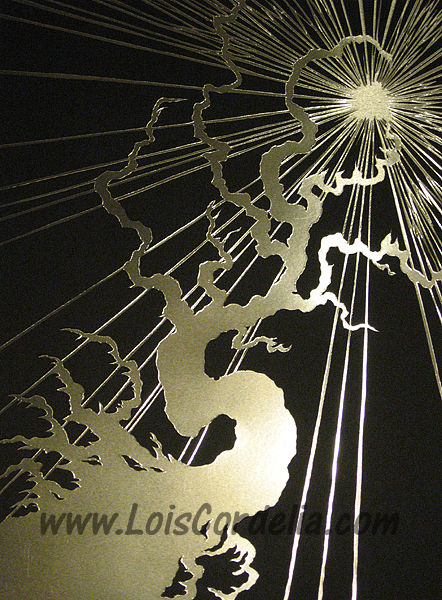












"Some are
leaves, some are branches,
I and I are the roots"
- Roots (Bob Marley) |
"Roots and Culture"
'Roots and Culture' is a fundamental concept in
Rastafari. Essentially, it promotes the awareness of
one's cultural and spiritual heritage - a theme that can
be relevant to every individual, whatever his or her
background.

It is often said, If you don't know where
you're coming from, you won't know where you're going.
For Black Africans exiled for generations in the
Caribbean, the rediscovery of an ancient and noble
heritage has enabled a re-evaluation of their own
identity, and encouraged them to break the shackles of
the slave mentality and aspire to the heights of a
glorious African past.
The Rastafarian dream of repatriation is closely linked to the
rediscovery of one's roots. Traditionally, repatriation
was seen in very literal terms of travelling back to Africa, to the homeland of Black ancestors who
were forcefully removed during the years of the slave
trade.

However, as Rastafarian practice becomes increasingly
diverse, this geographically limited concept has
necessarily grown to accommodate the aspirations of non
Africans, who frequently interpret 'repatriation' in
metaphorical or specifically spiritual terms, as the urge
to leave behind the snare of temptation and negative
feeling ('Babylon') in an effort to return to a purer and
cleaner state of mind ('Zion').
Today, anthropologists tell us that Africa was the true cradle of humankind. This
seems to evoke a very deep emotional response in many
people, even in those who are not of recent African
descent. It is easy to dismiss this feeling as a
projection of a romanticised ideal of the primordial
earthly paradise. But such a widespread resurgence of
interest in all things African may suggest some lingering
consciousness of a universal African aboriginal identity
of humankind.
As the roots of a plant anchor it in the ground and give
it stability, the knowledge of one's cultural and
spiritual heritage gives a sure foundation on which to
build one's sense of identity. It may also engender deep
feelings of appreciation, admiration and respect for
those who have gone before and helped to shape our modern
world. Thus it may reverse the current trend of
dismissing our ancestors as simple minded folk who
believed in magic and miracles and the sacredness of
things, so that perhaps ultimately we can learn from them
important and refreshing lessons for our secular age.

The prevailing assumption in the west that progress
demands us to turn our backs on the past and look instead
to the future has caused tradition, myth and ritual to be
forgotten. Such ancient relics appear to have no relation
to our present existence. We often speak of them being
'stuck in the past'. But the Rastafarian concept of roots
and culture is based on a much more dynamic and
flexible understanding of 'tradition' as
living, constantly evolving, adaptive and adoptive, the
collective experience of communities accumulated by
successive generations since time immemorial.
If we look to the past which is known, rather than to the
future which is unknown, we are not prone to suffer from
blindness of vision, and so we gain a true sense of
perspective in time, seeing our own place in history. The
future need not surprise us unawares, for it is not
substantially different from the past: tomorrow contains
elements of yesterday and today.
Thus the past is the key to the future, just as the
awareness of cultural roots is the key to society's
progress, and the acknowledgement of one's spiritual
roots in God is the key to mystical union with the Most
High.
Back to 'Key Biblical Concepts
In Rasta Reggae Lyrics' page

|

